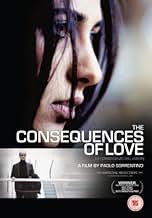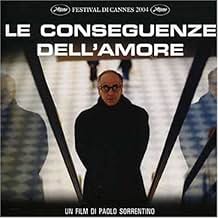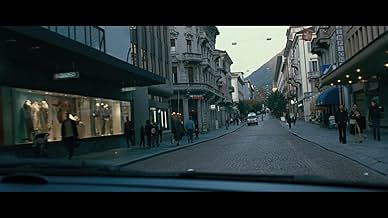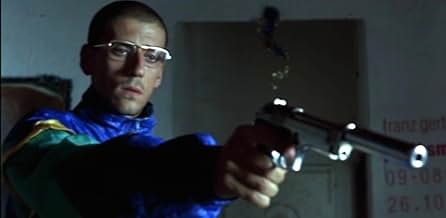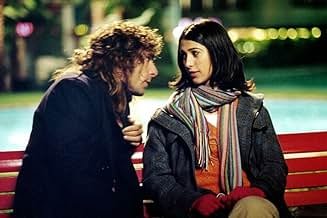NOTE IMDb
7,5/10
20 k
MA NOTE
La vie d'un introverti change complètement quand il se trouve attiré par une jeune serveuse.La vie d'un introverti change complètement quand il se trouve attiré par une jeune serveuse.La vie d'un introverti change complètement quand il se trouve attiré par une jeune serveuse.
- Réalisation
- Scénario
- Casting principal
- Récompenses
- 20 victoires et 21 nominations au total
Vincenzo Vitagliano
- Pippo D'Antò
- (as Enzo Vitagliano)
Avis à la une
I saw this interesting film back to back with the Chinese/French film "2046" at the recent Dubai Film festival. Both were intelligent works made the same year (2004/2005). Both had the main characters living in a "hotel". In both films, the hotel is more a metaphor of exile than a location. Both dealt with love between a man and a woman. Both had wonderful music and riveting performances. What a coincidence and yet how the two films differ in treatment of the subject!
Somewhere at the beginning of the film, a man walking on a pavement turns to look at a woman and in doing so hits a lamp post. The audience erupts into a volcano of laughter innocently. But isn't that brief shot the synopsis of the film, that entertains you for 2 hours? While the film is a wonderful blend of black comedy (e.g., using a stethoscope to listen to a neighbor's conversation in the adjoining hotel room), the film builds on what Buster Keaton and Jacques Tati had introduced to cinema earlier--stoic faces that leads to comedy quite in contrast to the equally intelligent world of Robin Williams or the heartwarming Danny Kaye. A sudden frenzy of activity transforms an otherwise stoic character while moving money from the hotel to the bank is reminiscent of Tati's works.
But the film is not mere comedy. The anti-automation statement (cash counting and the reaction of the bank staff to the statements relating to it, the dummy that acts as an ineffectual warning to the speeding lady, the reference to "Moulimix" as the fictitious "company" he works for, etc.) are several cues that the director is offering a loaded comedy to the viewer. Laugh, yes, but reflect on it and enjoy further..
The movie's strength lies in is brief, staccato script (by director Paul Sorrentino) that offers comedy that is mixed with philosophy ("Truth is boring," "Dad is dead, but nobody told him," "Bad luck does not exist--it is the invention of the losers and the poor". Then the director goes on to provide you with a fascinating lecture from the main character on insomniacs. You will not sleep through this lecture.
Sorrentino provides entertainment pegged to the subject the Italians know best--the Mafia. It is an existential mafia film.
There is a loaded philosophical sequence where a young girl, sitting opposite the lead character Titta Di Girolamo, reads aloud a passage from a book: "Whatever he wants can happen. What a fine mess. That is the advantage of using memories to excite oneself. You can own memories, you can buy even more beautiful ones. But life is more complicated, human life especially so, a frightening, desperate adventure. Compared to this life of formal perfectionism, cocaine is nothing but a stationmaster's pastime. Let us return to Sophie.. We become poetic as we admire her being, beautiful and reckless, the rhythm of her life flowed from different springs than ours. Ours can only creep along, envious. This force of happiness both exciting and sweet, that animated her, disturbed us. It unsettled us in an enchanting way, but it unsettled us nevertheless. That's the word." The reaction of Titta to the passage is interesting. Titta is himself a cocaine addict. Titta looks at the barmaid of the hotel-his own "formal perfectionism." The following sequence is of Titta calling his own wife and daughter on the phone--a conversation filled more with silence than words. They, too, are Titta's "memories." The final sequence of the film is of Tittas' best friend Dino Guiffre working alone repairing a fault on an electricity pylon in biting wind in a snowy landscape--recalling his own best friend Titta. This is a film about friendship that transcends the mafia.
Since "Truth is boring", the director provides a dessert as part of the fine meal of superb acting (Toni Servillo), good music, clever camera-work (Luca Bigazzi), a beautiful, enigmatic actress (Magnani, grand-daughter of the great, immortal beauty Anna Magnani) and powerful script. The dessert is for the viewer to figure out the truthful feelings of Titta, towards his family members, towards his hotel guests, towards the bar girl, towards the mafia, towards the bankers, towards the hotel owner, and towards his best friend Dino. (Assuming that the viewer accepts the eventuality of how Titta recovered his suitcase from the goons, how does he get inside his car and get it covered with its synthetic cover while he is still inside it?) Perhaps it is Sorrentino's admitted love for the literary works of Louis- Ferdinand Céline that has sculpted the character of Titta. The film's end will remain an enigmatic one for a reflective viewer.
Somewhere at the beginning of the film, a man walking on a pavement turns to look at a woman and in doing so hits a lamp post. The audience erupts into a volcano of laughter innocently. But isn't that brief shot the synopsis of the film, that entertains you for 2 hours? While the film is a wonderful blend of black comedy (e.g., using a stethoscope to listen to a neighbor's conversation in the adjoining hotel room), the film builds on what Buster Keaton and Jacques Tati had introduced to cinema earlier--stoic faces that leads to comedy quite in contrast to the equally intelligent world of Robin Williams or the heartwarming Danny Kaye. A sudden frenzy of activity transforms an otherwise stoic character while moving money from the hotel to the bank is reminiscent of Tati's works.
But the film is not mere comedy. The anti-automation statement (cash counting and the reaction of the bank staff to the statements relating to it, the dummy that acts as an ineffectual warning to the speeding lady, the reference to "Moulimix" as the fictitious "company" he works for, etc.) are several cues that the director is offering a loaded comedy to the viewer. Laugh, yes, but reflect on it and enjoy further..
The movie's strength lies in is brief, staccato script (by director Paul Sorrentino) that offers comedy that is mixed with philosophy ("Truth is boring," "Dad is dead, but nobody told him," "Bad luck does not exist--it is the invention of the losers and the poor". Then the director goes on to provide you with a fascinating lecture from the main character on insomniacs. You will not sleep through this lecture.
Sorrentino provides entertainment pegged to the subject the Italians know best--the Mafia. It is an existential mafia film.
There is a loaded philosophical sequence where a young girl, sitting opposite the lead character Titta Di Girolamo, reads aloud a passage from a book: "Whatever he wants can happen. What a fine mess. That is the advantage of using memories to excite oneself. You can own memories, you can buy even more beautiful ones. But life is more complicated, human life especially so, a frightening, desperate adventure. Compared to this life of formal perfectionism, cocaine is nothing but a stationmaster's pastime. Let us return to Sophie.. We become poetic as we admire her being, beautiful and reckless, the rhythm of her life flowed from different springs than ours. Ours can only creep along, envious. This force of happiness both exciting and sweet, that animated her, disturbed us. It unsettled us in an enchanting way, but it unsettled us nevertheless. That's the word." The reaction of Titta to the passage is interesting. Titta is himself a cocaine addict. Titta looks at the barmaid of the hotel-his own "formal perfectionism." The following sequence is of Titta calling his own wife and daughter on the phone--a conversation filled more with silence than words. They, too, are Titta's "memories." The final sequence of the film is of Tittas' best friend Dino Guiffre working alone repairing a fault on an electricity pylon in biting wind in a snowy landscape--recalling his own best friend Titta. This is a film about friendship that transcends the mafia.
Since "Truth is boring", the director provides a dessert as part of the fine meal of superb acting (Toni Servillo), good music, clever camera-work (Luca Bigazzi), a beautiful, enigmatic actress (Magnani, grand-daughter of the great, immortal beauty Anna Magnani) and powerful script. The dessert is for the viewer to figure out the truthful feelings of Titta, towards his family members, towards his hotel guests, towards the bar girl, towards the mafia, towards the bankers, towards the hotel owner, and towards his best friend Dino. (Assuming that the viewer accepts the eventuality of how Titta recovered his suitcase from the goons, how does he get inside his car and get it covered with its synthetic cover while he is still inside it?) Perhaps it is Sorrentino's admitted love for the literary works of Louis- Ferdinand Céline that has sculpted the character of Titta. The film's end will remain an enigmatic one for a reflective viewer.
I saw Le Conseguenze Dell'Amore on the 2005 Rotterdam Filmfestival, It was the first of ten films I saw there.
Le Conseguenze has left the most powerful impression of the ten films. From the first shot, you know the movie is going to be something special. The beautiful cinematography left me in awe of what can be done with a camera. The music is also on par with the visuals, complementing the colorful and stylish architecture-like images.
Toni Servillo plays the main character in the film, Titta. He's a tax expert gone wrong who lives in a hotel. Every week, he brings a suitcase with money to a bank and the story plays around this.
He is always very controlled and shows almost no emotion to anyone; Looks calculated and well-dressed. He has a habit of ignoring people who are of no significance to him. For example Sofia (played very nicely by Olivia Magnani), who works as a barmaid in the hotel where he lives. Although she's been working in the hotel for two years, he never greets her, even if she does greet him. On one day she confronts him with this and the next day he sits at the bar, instead of his usual spot at a window. From here the story really begins, and will unfold in a strong tale of love, sacrifice and the mafia.
I won't spoil the rest of the film. See this film if you love stylish movies like ones from David Lynch, The Godfather, etc. Don't see this if you're an action-buff.
Le Conseguenze has left the most powerful impression of the ten films. From the first shot, you know the movie is going to be something special. The beautiful cinematography left me in awe of what can be done with a camera. The music is also on par with the visuals, complementing the colorful and stylish architecture-like images.
Toni Servillo plays the main character in the film, Titta. He's a tax expert gone wrong who lives in a hotel. Every week, he brings a suitcase with money to a bank and the story plays around this.
He is always very controlled and shows almost no emotion to anyone; Looks calculated and well-dressed. He has a habit of ignoring people who are of no significance to him. For example Sofia (played very nicely by Olivia Magnani), who works as a barmaid in the hotel where he lives. Although she's been working in the hotel for two years, he never greets her, even if she does greet him. On one day she confronts him with this and the next day he sits at the bar, instead of his usual spot at a window. From here the story really begins, and will unfold in a strong tale of love, sacrifice and the mafia.
I won't spoil the rest of the film. See this film if you love stylish movies like ones from David Lynch, The Godfather, etc. Don't see this if you're an action-buff.
Although I totally agree with the previous comment regarding the marvellous acting of Toni Servillo as Titta Di Girolamo, I would also like to add the beautiful filming and montage which turns this movie virtually into a painting. The young director Paolo Sorrentino had the courage to experiment with different types of camera techniques which reminded me of Darren Aronofsky' Requiem for a Dream. They both used the same MTV-style filming combined with modern (alternative/techno) music, making the film Le Consequenze dell'Amore - stand apart from the other crime/mafia movies in its genre. Even though the movie may start of very slow-paced almost "sec" compared to the faster Hollywood productions it should be enjoyed cause of its serenity, marvellous character portray and splendid ending. Definitely a must see for people who enjoy the European/Italian cinema. PS Toni keep on acting like this we need an encore.
10dadie
There are movies that are just a different version of another one, not remakes, but just similar to others, it is not. Although it talks about Mafia it is watched in another way and often it seems just a secondary theme. I went to watch that movie for case (because the otherone's theatre was full) and I was satisfied at the end. It surprised me, because of its black irony or cynicism and there are more and more interesting items to analyze. It doesn't follow the classical ways of movies, it is just different and I think not to be the only one to like that. I am very happy also because it is Italian, and I was afraid that Italian directors and producers were not enough brave to change themes. In this movie you can watch new Italian style as well, but is not blocked into clichés. I hope to be understandable enough, I know it is difficult, I hope also that this movie can be exported out of our frontiers, it is a good product to export. I want to point out also the music, very good soundtrack, the movie needs it because of its long silent pause and they are covered perfectly by that music. Many compliments to the director, and thank you, cinema needs these movies.
The consequences of love: There is really something special about this film but it's very hard to put your finger on. It is a love story of sorts but not really one i've seen before. It has several love themes running throughout the film. One mans love for a younger woman, a younger mans love for his older brother, the mafias love of money at all costs these are just some that intertwine in a story that has you guessing or rather not knowing where and how it will end. The cast are all superb from Sophia the teasing barmaid to the straight faced-ness of titta the films central character. With simple yet affective camera work bounced off an ever-changing soundtrack that mixes low-fi trip hop with lush orchestral pieces. The style of the film changes beautifully using several styles without ever getting cluttered. Love has never looked so diverse and powerful as the tales we are told rumble towards various conclusions. The director has married old and new into a rich Italian classic.
Le saviez-vous
- AnecdotesThe book the girl at the table reads is Louis-Ferdinand Céline's "Voyage au bout de la Nuit" (1932).
- GaffesThe barrel of the tracksuit-clad assassin's fired gun, lying on the hotel mattress while the assassin is packing for departure, appears defective, i.e., rubbery, as the silencer barrel is angled downward. Moments later, after he picks up the gun and points it at the hotel room door, the barrel appears longer and straighter, as it was in the earlier scenes.
- Citations
Titta: In the world there's a certain kind of cult, with men and women of all social classes, of all ages and of all religions. It is the insomniacs cult. I'm part of it. For ten years. Those who don't belong to the cult sometimes tend to say: "If you can't sleep, you can read, watch TV, study or do something else". That kind of phrase is deeply annoying to the members of the cult. And the reason is simple. Cause the insomniac has only one obsession: to sleep.
Meilleurs choix
Connectez-vous pour évaluer et suivre la liste de favoris afin de recevoir des recommandations personnalisées
- How long is The Consequences of Love?Alimenté par Alexa
Détails
Box-office
- Budget
- 2 000 000 € (estimé)
- Montant brut mondial
- 2 556 056 $US
- Durée
- 1h 40min(100 min)
- Couleur
- Mixage
- Rapport de forme
- 2.35 : 1
Contribuer à cette page
Suggérer une modification ou ajouter du contenu manquant

![Regarder Trailer [OV]](https://m.media-amazon.com/images/M/MV5BYTE4NzdmOGQtOTU4OC00YTJlLThiYzQtYjkwZWZlMDEzMzVjXkEyXkFqcGdeQXRyYW5zY29kZS13b3JrZmxvdw@@._V1_QL75_UX500_CR0)
